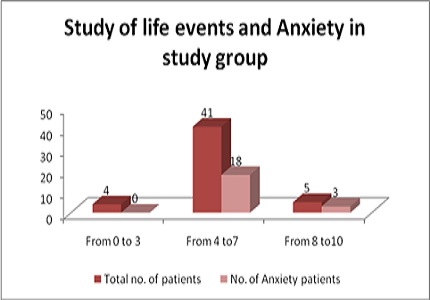Psychological manifestations in post myocardial infraction patients
Abstract
Background: In the past few years a very important observation that came to light is the increase in prevalence of some psychiatric disorder in chronically ill patients. Symptoms of depression and anxiety are common following myocardial infarction (MI). Both the symptoms have been linked with increased risk of recurrent coronary artery disease (CAD), Severe psychological stress, major life events, and depression causes myocardial infarction (MI) in 15% of case of Coronary Artery Disease (CAD) and are associated with higher rates of morbidity and mortality.
Objective: (1) To establish the diagnosis of myocardial infarction in patients. (2) To study and correlate various psychological manifestations in these patients.
Methodology: The patients for the present study were taken up from those admitted in ICCU and OPD of department of Medicine G.M.C, Ambikapur, during the study period. 50 patients were studied having CAD (Myocardial infarction). The patients were history taken in detailed & examined (Physical and Psychiatric), investigated with reference to ECG proven myocardial infarction or cardiac enzymes proven MI.
Results: We have found 46% of prevalence rate of depression in our study. Majority of patients (20%) have mild depression (score 10-13) on (HAD-Scale), 12% have major depression, 42% had Anxiety. Majority of patients 26% have mild anxiety. Only 6% have severe anxiety (score > 30) in our study.
Conclusion: Personality feature of CAD patients are associated with emotional as sympathetic arousal which result in increases in catecholamine as consequent increase in mobilization of free fatty acid from adipose tissue, aggregation of platelets which may precipitate MI. So, a thorough research, prevention and rehabilitation of psychologically oriented care can increase the patients sense of security and is fundamental basis of successful medical care.
Downloads
References
Rozanski A, Blumenthal JA, Kaplan J. Impact of psychological factors on the pathogenesis of cardiovascular disease and implications for therapy. Circulation. 1999 Apr 27;99(16):2192-217.
Ter Horst GJ et al. Central autonomic control of the heart angina and pathogenic mechanisms of post myocardial infarction depression European Journal of Morphology. 1999; 37(4-5) : 257-66.
Paterniti S et al. Sustained anxiety and 4- year progression of carotid atherosclerosis, thrombosis and vascular biology. 2001; 21(I) : 136-41.
Mittleman MA, Maclure M, Sherwood JB, Mulry RP, Tofler GH, Jacobs SC, Friedman R, Benson H, Muller JE. Determinants of Myocardial Infarction Onset Study Investigators. Circulation. 1995 Oct 1;92(7):1720-5.
Heather S.Lett et al. Depression as independent factor in CAD patients. Cardiology 1983;70:308–16, 2002.
Thiel HG, Parker D, Bruce TA. Stress factors and the risk of myocardial infarction. J Psychosom Res. 1973 Jan;17(1):43-57.
Barry J. et al. Frequency of ST segment depression produced by mental stress in stable angina pectoris from coronary artery disease AM J. Cardial. 1998; 61(13) : 989-993
Kane FJ Jr. et al. Chest Pain and anxiety disorder. Tex Med. 1990 Jul;86(7):104-10.
O. Brien J.L. et al. Comparison of anxiety assessments between clinician and patients with acute myocardial infarction in cardiac critical care units. Am J Crit Care. 2001 Mar;10(2):97-103.
Rasik CH et al. The impact of religious orientation in conjugal bereavement among older adults. Int J Aging Hum Dev. 2011;72(2):137-54.
Lavoie KL, Fleet RP. The impact of depression on the course and outcome of coronary artery disease: review for cardiologists. Can J Cardiol. 2000 May;16(5):653-62.
Ulla Edell Gustafsson et.al. Sleep, arousal and health-related quality of life in men and women with coronary artery disease. Journal of Clinical Nursing, 2011; 20(19-20), 2787-2801.
Bluementhal JA et al. Mental Stress induced ischemia in the laboratory and ambulatory ischemia during daily life. Circulation. 1995 Oct 15;92(8):2102-8.
Bluementhal JA et al. Stress management and exercise treatment in cardiac patients with myocardial ischemia. Arch Intern Med. 1997 Oct 27;157(19):2213-23.



 OAI - Open Archives Initiative
OAI - Open Archives Initiative


